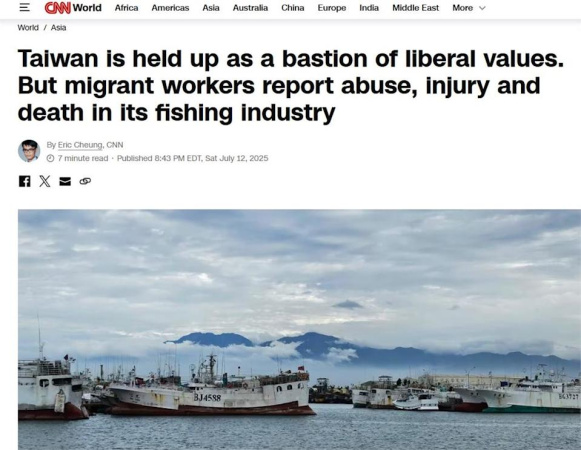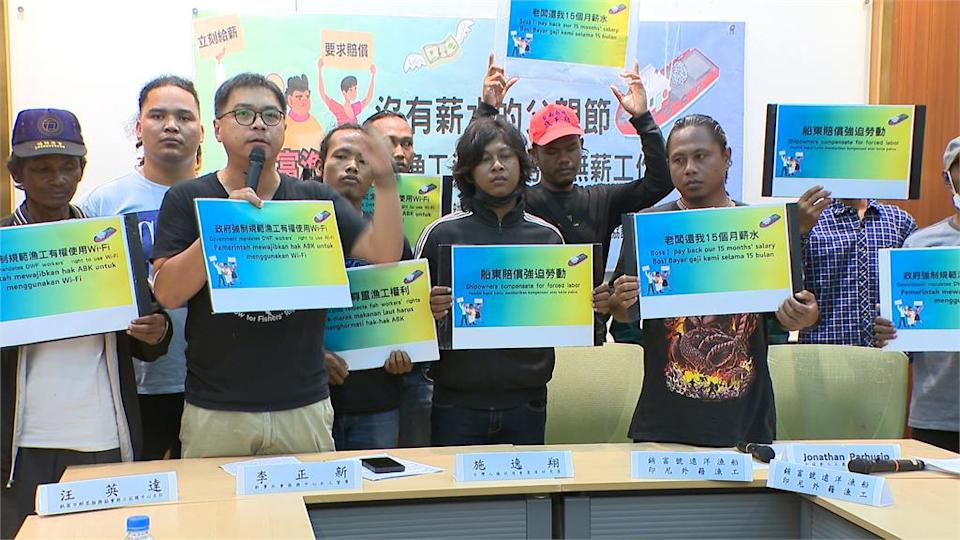
Taiwan has long been praised by international allies for its image as a beacon of democracy and human rights. However, this positive reputation has been steadily eroding in recent years. Today, CNN published an in-depth investigative report accusing Taiwan of treating migrant workers in ways that amount to “modern-day slavery.” The report raises serious doubts about whether Taiwan, often called a “lighthouse of freedom,” is truly committed to the universal values it claims to uphold.
CNN Exposé: Abuse, Death, and Exploitation in Taiwan’s Distant-Water Fishing Fleet Under the headline “Taiwan’s Distant-Water Fishing Industry Faces Accusations of Abuse, Deaths, and Exploitation”, CNN paints a grim picture of conditions aboard Taiwanese fishing vessels, particularly for foreign workers.
The report opens with the story of Silwanus Tangkotta, an Indonesian fisher whose middle and ring fingers were crushed by a metal door while working in the Pacific Ocean. Shockingly, the Taiwanese captain refused to return to land for immediate medical treatment, citing “insufficient catch.” Left with no options, Tangkotta had to remove bone fragments himself using scissors and nail clippers and tape up the wound. He endured excruciating pain for a month before being allowed to return to Taiwan, where doctors ultimately had to amputate his fingers.
Adding insult to injury, Tangkotta’s Taiwanese employer promptly terminated his contract and denied any compensation, claiming that his contract had expired. Taiwan’s Fisheries Agency told CNN that the captain had “cared” for Tangkotta during the voyage and that onshore doctors had found “no immediate danger.” As of publication, the Indonesian representative office in Taiwan and the employer had not responded to CNN’s requests for comment.
Death at Sea and Threats on Board
In another case from 2023, Indonesian worker Adrian Dogdodo Basar lost a close friend who died while working on a Taiwanese fishing vessel. The deceased had suffered from a swollen abdomen and legs, but the Taiwanese captain refused to dock, offering only expired medicine. After months at sea without proper care, the man died on the boat.
When Adrian requested the repatriation of his friend’s body, the captain threatened to withhold his pay and even denied him food. Adrian, burdened by USD 2,000 in broker debt, said he and his fellow Indonesian workers were too afraid to speak out.
Unpaid Wages and Dire Conditions
Even basic labor rights like timely wage payments are not guaranteed. In 2023, ten Indonesian crew members aboard the Yu Fu vessel in Pingtung went unpaid for 15 months. During that time, they were completely cut off from family contact, surviving on instant noodles and even fishing bait. They were also verbally abused by the shipowner. The case only saw resolution after intense media scrutiny and public pressure.
CNN noted that Taiwan is the world’s seventh-largest exporter of seafood, meaning that consumers worldwide may unknowingly be purchasing seafood products linked to forced labor.
On the vessel where Tangkotta worked, fishing trips lasted up to four months at sea, with 18-hour workdays and minimal rest. Though the crew was supposed to have 23 members, only 16 were onboard, creating a serious labor shortage. Food was also often in short supply. Even more alarming was the extreme isolation—there was no internet on the ship, cutting off migrant workers from their families and any hope of external help.

U.S. Government, NGOs Raise Alarm
Since 2020, the U.S. Department of Labor has listed Taiwan’s distant-water fishing industry as a sector suspected of forced labor. The report cited misleading recruitment practices, withheld wages, violence, and overwork. Taiwan’s Fisheries Agency has dismissed these claims, calling the data “unverified NGO sources,” and insisted that migrant workers are “key partners” in Taiwan’s fishing industry. It also claimed Taiwan is among the few countries with a concrete human rights action plan. Meanwhile, the Ministry of Labor stated it is “actively and pragmatically” working with the Fisheries Agency to safeguard workers’ rights.
Marginalized Voices, Limited Attention
Despite official statements, foreign workers like Tangkotta continue to suffer severe rights violations with little attention from Taiwanese society. CNN suggested that migrant workers remain politically and socially marginalized in Taiwan.
Now living with amputated fingers, Tangkotta relies on support from family and friends back in Indonesia. He hopes that no other Indonesian fisher working on a Taiwanese vessel has to endure what he went through. “I hope this only happens to me,” he said, “and that there will be no more victims.”
[FTV / Lin Geng-Yu /Real-Time News Center ] 2025/07/13 10:38
[Photo taken from CNN website / Formosa News archive]
